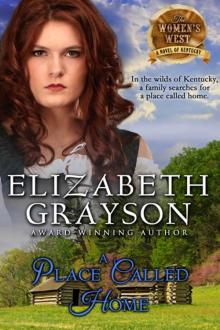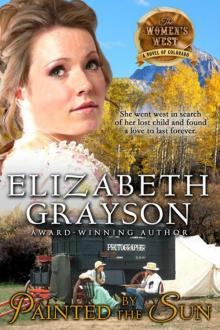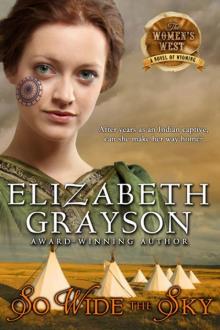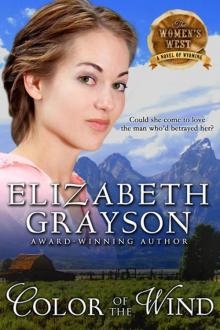- Home
- Elizabeth Grayson
Painted by the Sun Page 2
Painted by the Sun Read online
Page 2
Judge Gallimore must be waiting off to one side. She could almost see him standing with his head high and his mouth pulled so taut it would be all but hidden beneath the drape of that luxuriant mustache. He'd be the very portrait of a man living up to his responsibilities.
The moment she'd flung back the camera's dark-cloth she'd recognized him as someone of consequence. Beyond his intimidating height and the lean, leashed power of his body, there had been something in those sharp patrician features that bespoke intelligence, high standards, and influence, nobility—and outrage.
Then, she'd caught a flicker of the man behind that facade, shades of vulnerability in those night blue eyes. Before she could consider what she'd seen, he'd prodded her, asked why she was taking this photograph. She should have known better than to argue with a man like him, a man with such obvious authority. She should have held her peace—but getting this photograph meant too much.
From out where the gallows stood, Shea could hear the sheriff calling for order. She raised her eyes to the window and listened.
He began to read. "For being found guilty of murdering Ned Barstow in cold blood, the First District Court of the Territory of Colorado sentences Joe Calvert to death by hanging."
The crowd mumbled in agreement.
"Let us pray," the parson intoned. In a high, reedy voice he blessed the man Calvert had killed, asked repentance and redemption for Calvert himself, and finally prayed for everyone who came out to see justice done.
Shea bowed her head, and her own guilt lay heavy as God's broad hands on her shoulders. Repenting her own sins was taking everything she had, but she was trying.
People had begun to murmur and shift their feet by the time the preacher said "Amen."
"You have anything to say for yourself, Calvert?" the sheriff asked.
Silence fell and Shea could picture the crowd easing toward the gallows to listen.
Calvert must be standing in the very shadow of the noose looking out over that sea of avid faces. Did he realize these were the last words he'd ever speak? Small wonder they came so slowly.
"I'm so damn sorry I killed Ned Barstow," he said. "He was my best friend."
She could hear the regret in Calvert's admission. In spite of knowing what he'd done, her throat constricted.
"You should'a thought o' that b'fore you put yer knife in Barstow's belly," someone shouted.
"Just get on with it," another man urged.
"Hang the bleeding bastard!"
A haze of noisy agreement rolled out of the crowd like steam from a pot bubbling over the fire. It billowed, becoming a clamor; a babel, a roar. The rumble and churn reverberated off the walls of Shea's tiny cell. Out in the midst of the mob the volume must be deafening.
Then everything went still.
Though she had never seen a hanging, Shea realized what that silence meant. The sheriff was pulling a rough black hood over Calvert's head, tightening the rope around his neck, pulling it taut. It meant they were ready to—
There was the rattle of some mechanical device, the thud of wood rebounding against wood. In the vacant lot beyond her cell, the miners gasped.
Shea's knees wobbled and gave way. She reeled backward, collided with the three-legged stool in the corner of her cell, and sat down hard.
From beyond the wall a cheer broke out. The miners howled and hooted and might well be slapping each other on the back as if they'd accomplished something brave and wonderful.
Barbarous men, Shea thought, shuddering. How could they have watched that? How could they cheer?
Unbidden thoughts of Cameron Gallimore flitted through Shea's head. If he was out there among those drunken, yelling men, he'd be standing silent as a pillar of granite. No matter how deserving of condemnation Calvert had been, Shea sensed Judge Gallimore would have taken no satisfaction in his death.
Thinking of him, Shea suddenly realized how glad she was that she hadn't been at the foot of the gallows to take that photograph. She didn't want Calvert's death captured in silver on one of her glass plates. She didn't want to be able to make hundreds of copies of what she would have seen, or relive what happened every time she did. She didn't want to implant that image in anyone else's mind.
Any money she might have made from selling the photograph would have seemed like blood money. She was a photographer, a businesswoman, not a mercenary. She was proud of what she did, and she would never have been able to be proud of this.
As angry as she'd been and as much she could have used the proceeds from selling this photograph, she didn't regret that Judge Gallimore had intervened. She supposed she should thank the man for what he'd done—and knew she would not.
Chapter 2
Shea had been pacing her cell for more than an hour when Sheriff Willoughby came to let her out.
"And Judge Gallimore said it was all right?" she asked with some asperity as he opened the door. "He's not going to charge me with public lewdness or disturbing the peace?"
The sheriff dipped his head a little to hide a smile. "Cam's a damn fine judge, ma'am," he allowed, leading her into the office proper. "He just didn't want you taking a picture of the hanging, is all."
"Well, he's had his way," she observed with a sniff. "Did he tell you to return my camera?"
He gestured to where the big box camera sat in the corner of the office. "We took good care of 'er."
"I should hope so."
Willoughby nodded toward the open door. "Can I tote that camera for you, ma'am?"
Shea thanked him and headed toward where her assistant, Owen Brandt, had parked their photography wagon across the street from the jail.
"All right?" Owen asked, as she approached. "You all right?"
Shea smiled up at the squat little man perched on the lip of the wagon seat. His shoulders were hunched, and anxiety had pinched harsh folds into his soft, apple-dumpling face.
"I'm fine, old dear, so don't you worry. And I got our camera back."
"Good," he said, the lines around his prim mouth easing. "Good."
Just as Shea turned to claim the camera from Sheriff Willoughby, two horsemen came galloping up the street whooping and hollering and firing their revolvers in the air. Shea and the sheriff pressed back against the side of the wagon as they swept by.
Drawn by the noise and excitement, miners spewed out the doors of the saloons on Main Street. They engulfed the horsemen, who fired a few more shots in the air, reholstered their pistols, and all but pitched out of their saddles.
Beside her the sheriff sighed and straightened. " 'Scuse me, Mrs. Waterston," he said with a tip of his hat. "I got me some drunken miners to toss in the hoosegow."
Several deputies came to help him make arrests and herd everyone still sober enough to stand back into the drinking establishments.
When things quieted, Shea glanced up toward the wagon seat and saw that Owen had disappeared. "Owen!" she cried as she leaned the camera against the wagon and scrambled up the side. "Owen?"
Shea found the old man crouched in the knee-well, shivering like someone in the throes of fever.
"Owen," she breathed in relief and reached for him. "Are you all right, old dear?"
His hat was gone, his bald pate shone with sweat, and his eyes glistened with incalculable terror.
"Owen, it's me," she murmured, reaching to lay her hand against his sleeve, stroking him like she always did when the demons chased him.
He stared at her and slowly recognition dawned across his features. An instant later hot shame flooded his cheeks, and he tried to push her hand away.
"You're all right, old dear," she crooned, still chafing his arm. "You're all right now."
It took a good long while to coax Owen out of the knee-well and onto the wagon seat, and then he sat gingerly, as if any minute he expected the thing to buck him off.
Seeing the worst was over, Shea shoved back a palmful of her unruly curls. "Will you be all right if I just go put the camera away?" she asked him.
Owen managed a jerky nod.
Shea climbed down to the street, reclaimed her camera, and proceeded around to the back of the photography wagon. Once she was out of sight her knees gave way. As often as she'd seen them, Owen's episodes of panic still unnerved her. Her husband Simon had been better at calming him than she was. But then, Simon and Owen had come through the war together.
Shaking her head, Shea furled the tarp that hung across the back of the Union ambulance Simon had converted to a rolling darkroom. It was the one he and Owen had taken to the army camps and battlefields, to places like Bull Run and Chancellorsville.
As she lowered the tailgate, she remembered how the tiny interior had been packed to the struts when they'd headed up to the mountains eight weeks ago. Now she could climb right in and put the tripod and camera away.
Owen was still clinging to the wagon seat when she got back.
Shea clambered up beside him and patted his knee. "You 'bout ready to leave this town?" she asked.
He looked over at her and chanced a wobbly smile. "Let's go, Sparrow."
Shea's heart pinched a little every time Owen called her by Simon's pet name. The endearment had been a joke between them, a reminder of how her husband had found her huddled in the snow outside his studio. Hearing the name on Owen's lips reminded her how hollow she'd felt since Simon died, how detached and rootless her life had suddenly seemed.
Well, finding her son was going to change all that, she told herself. Finding her son was going to change everything. Maybe once they reached Denver they'd be able to chase down word of him. Imagining their reunion, she picked up the reins and clucked to the horses.
* * *
Shea was repacking the wagon the morning of their third day out of Breckenridge, when a pair of roughly dressed men approached the camp. Without so much as a thought, Shea reached for the Winchester propped up beside her.
Caution was a reflex in such country as this. It was a wise—and not necessarily inhospitable—thing to be ready if trouble came at you.
"Morning, ma'am," the taller of the two men greeted her, pulling his horse up short at the edge of her camp.
"Good morning," she answered, then stood with the rifle nestled comfortably in the crook of her arm, waiting for him to state his business.
"We come down from Breckenridge day before yesterday," he continued, "headed toward Denver. You going that way?"
"We left Breckenridge ourselves two days ago," Shea volunteered.
The second man bobbed his head and gave a cackle of recognition. "You're that lady photographer, ain't ya? The one that wanted to take a picture of Joe Calvert's hanging."
Shea dipped her chin in acknowledgment.
"It's a damn shame how that judge treated you," the man went on. "Not letting you take that photograph, tossing you in the hoosegow because you argued with him. Wasn't I telling you about it, Lyle, just last night?"
"He said you was a feisty little thing to stand up to Judge Gallimore the way you did," Lyle agreed with a grin.
It was just as well these two men thought she was feisty, Shea reflected. They were rough, uneducated men, like hundreds she'd photographed over the last two years—drifters, working when and where they could. They'd take advantage of a woman if they thought she was weak, but Shea knew how to handle them. In this case, her reputation had preceded her. She lowered the Winchester.
If the first rule of the West was to be ready to defend yourself, the second was to offer what hospitality you could.
"Would you like a cup of coffee?" Shea inquired.
"Coffee'd be good, ma'am."
The two men dismounted and settled themselves. "My name's Lyle Smithers," the first man told her companionably. "And this here's Wally Barber."
Shea set the rifle well within reach and used a wad of rags to pull the coffeepot out of the coals.
As she poured a steamy brown stream into three tin cups, Owen came puffing up the rise. His sparse hair was slicked to his scalp and his face was pink from washing.
To Shea's eyes, he was a benign old man with more than his share of idiosyncrasies. What she needed these strangers to think was that he was considerably more than that.
Shea raised her head and sliced Owen a glance that stopped him at the back of the wagon.
"I'm Mrs. Waterston," she offered as she handed over two of the cups. "And this is my traveling companion, Owen Brandt."
Lyle looked up at where Owen stood solid and square, braced against the wagon's tailgate. He'd hooked his thumbs in his belt on either side of the foot-long skinning knife he wore on his belt. These two drifters didn't need to know that all Owen ever used it for was cutting rubber tubing.
"Is Mr. Brandt going to be joining us for coffee?" Wally Barber wondered nervously.
"Mr. Brandt doesn't want any coffee," Shea answered for him. "Mr. Brandt is fine right where he is."
By then, both of the men were studying Owen, and it was clear something about his demeanor unsettled them.
Finally, Smithers returned his attention to Shea. "So—so you're a lady photographer, are you, ma'am?"
"For some years now," Shea said, sipping from her cup.
"And do you take pictures of things besides hangings?"
"I do every kind of photography."
"Could you take a picture of Wally and me?"
The request caught Shea off guard. "Now?" she asked him.
Her gaze drifted over them. Most people wanted to look their best when they had their portraits made. Men waxed their mustaches and slicked down their hair. Women decked themselves out in their Sunday best and put on fine lace collars. These two didn't look like they'd be ready to be photographed in less than a week of waxing and slicking and decking out.
"Sure. Now'd be good." Lyle grinned revealing gaps in both rows of yellowing teeth. "What should we do? Where should we stand?"
Shea looked up at the steep walls of the canyon, judging the light. "It—it would be difficult to do a sitting here," Shea hedged, hating to set everything up for the sake of a pair of tintypes. "It isn't bright enough down here in the trees, and we'd have to haul water to process the pictures."
Both men looked crestfallen.
"I'm sorry," Shea murmured. "Maybe I can arrange to take your photographs once we reach Denver."
"We're not going right into town," Lyle said on a sigh.
"I don't see why we couldn't take her with us to camp," Wally proposed. "Don't you figure the boys'd be tickled for a chance to get their pictures made?"
Lyle shook his head as if to warn Wally off. "I don't know that Wes would like it."
Shea wasn't sure it was wise to head off to some camp in the mountains with men she'd never seen before today.
"Oh, Wes won't mind," Wally enthused. "You know what a dandy Wes is. And the women... Well, don't you think having a photographer come to town will be a treat for them?"
Something about Wally's boyish glee convinced her. And if there were women and families in the camp, Shea figured they'd be safe enough.
Lyle looked unconvinced.
"What kind of a camp?" Shea asked. "A mining camp?"
"Um—well. Yeah, sure," Lyle fumbled. "A mining camp."
"And how many photographs do you think I might be taking?"
"Oh, twenty, at least," Wally volunteered. "Maybe more than that, if the men ain't been playing poker and cleaned each other out."
More than twenty photographs! If Shea could take twenty photographs she'd have the money to put them up in Denver long enough to decide where they were heading next.
She agreed quickly. "We'll be happy to visit your camp if you'll show us the way."
It was only a matter of minutes before Shea and Owen had the wagon packed and were following Lyle and Wally down the mountain.
* * *
A good-sized crowd had congregated in front of the mining camp's single commercial building by the time they pulled the photography wagon to a stop. Shea could see right off that these weren't the kind of
folks she'd expected when Lyle and Wally had talked about the camp. What she'd hoped for were prospectors with full pokes who'd want pictures to send to their kin back east. What she got were a few bewhiskered miners; a goodly number of down-on-their-luck cowboys, four fading fancy women, and one lone boy who peeked at her around the women's skirts.
Still, Shea put on the best face she could and jumped down from the wagon to introduce herself. "Good afternoon. I'm Mrs. Waterston, a lady photographer lately of New York City. My assistant and I have come to your camp today to take the best photographic portraits you're ever likely to sit for." To prove her point she took out a tintype of a pretty saloon girl she'd photographed in Abilene and offered it for them to see.
A tall, blond man with a waxed mustache and pinstriped vest stepped forward and took the picture from her. He glanced down at the tintype in its cardboard sleeve, then raised his gaze and let it crawl over her.
Shea stood her ground in spite of the almost reptilian coldness in his heavy-lidded eyes.
"So you're a lady photographer?" he finally said.
Shea did her best to force a smile. "I make pictures of everything from church picnics to mountain scenery."
"But no pictures of hangings, huh?" Wally hooted from where he still sat his horse a few feet away.
Shea inclined her head. "I ran into a little unpleasantness in Breckenridge."
"She ended up in the calaboose!"
Lyle nudged Wally to silence, nearly knocking him out of the saddle.
The tall man's eyes slid over her a second time.
Shea's heart picked up speed. "It's not an experience I'm eager to repeat," she confessed.
Several men in the crowd snickered.
The man in the vest looked down at the photograph again.
"How much did you say you were charging for these?"
On the boardwalk back east, tintypes sold for a quarter. Out here where photographers were scarce, and especially considering the inconvenience of coming to their camp, Shea thought she could charge a good deal more.
"I figure a dollar," she told him. When no one complained, she pressed ahead. "So, which of you handsome gentlemen or fine ladies is going to be the first to be immortalized in a lovely photographic portrait?"

 A Place Called Home
A Place Called Home Painted by the Sun
Painted by the Sun So Wide the Sky
So Wide the Sky Color of the Wind
Color of the Wind